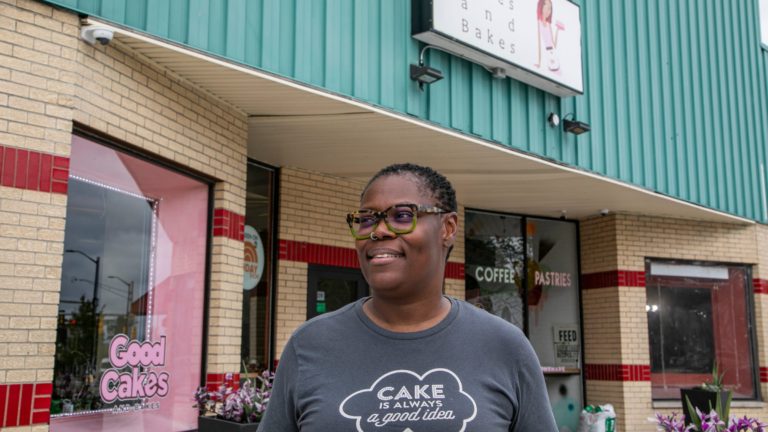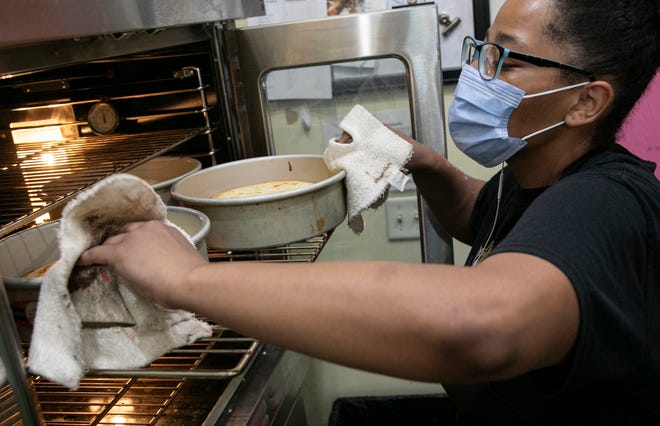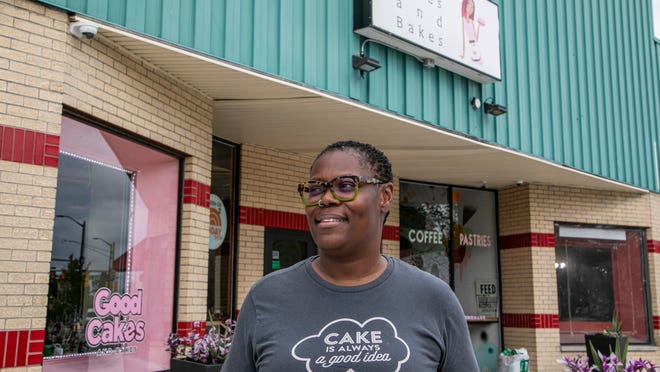
As a Black, openly gay woman, April Anderson said she is no stranger to discrimination.
But Anderson, a pastry chef with a national reputation, was taken aback by a recent cake order that came into her Good Cakes and Bakes bakery on Livernois in Detroit’s Avenue of Fashion commercial corridor.
And, at least at first, she was unsure how to handle it, worried she could wind up facing a lawsuit.
The customer — who turned out to be an employee of a Ferndale-based, conservative Catholic organization — wanted the cake decorated with a decidedly anti-gay message. It was a disturbing slap in the face to Anderson and her wife and business partner, Michelle.
More: How a right-wing, Ferndale fringe group is building a multimedia empire
“We are so used to being Black lesbian women,” Anderson said. “You are used to people discriminating against you and saying mean things to you.”
On July 19, an online order came in for one of the bakery’s red velvet dessert cakes — an Anderson specialty.

The $40 order was paid for by credit card and included a $10 tip — which is common.
What struck Anderson first was the word “PRIDE” was in all caps thinking it was for the rainbow-themed Pride Month cake the bakery offered in June.
“That was the cake for June, a six-layer cake for Pride month,” Anderson said. “That was done and over with. I thought, ‘I have to make another one of those cakes?'”
Then Anderson read the message the customer wanted written on the cake and was stunned.
“I am ordering this cake to celebrate and have PRIDE in true Christian marriage,” the customer said in the order. “I’d like you to write on the cake, in icing, ‘Homosexual acts are gravely evil. (Catholic Catechism 2357)'”
“This can’t be real was my first thought,” Anderson recalled.
Then she showed the order to Michelle.
“Why would somebody order this from us?” Anderson said. “They know our bakery. It’s not like it’s a secret. It says it on our about page and social media pages and very clear that this bakery is owned by two lesbian women.”
Anderson phoned her friend Eli Majid, who owns Eli’s Tea Bar in Birmingham.
“Do you believe someone just ordered that from the bakery?” she asked Majid.
Within an hour, Majid, using social channels and reverse phone lookup, identified the customer, his church and what college he went to. He was identified as David Gordon, in a followup Pridesource.com article.
The church affiliation led them to Church Militant, a Ferndale-based Catholic fringe group. On his Twitter account, Gordon is listed as “a copyeditor @Church Militant, Lawyer, theology MA, author, sportsman, family man.” He has more than 4,000 followers.

Responding late Tuesday to a Twitter message from a Free Press reporter, Gordon said the bakery “admits that it never had any intention of serving me and making me the custom red velvet cake that I duly requested and paid for.” He also said he was acting on his own behalf, without the knowledge of his employer, Church Militant.
“I was denied the services I requested at a place of public accommodation on the basis of the content of my beliefs — this is gleefully acknowledged by the owners of the bakery in the relevant Pridesource article,” Gordon said in his message.
“Imagine the umbrage if a homosexual couple arrived at their ‘wedding’ reception to find a Christian baker had made them a ‘straight’ cake. This is about fairness, not ideology.”
Michael Voris, the founder and president of St. Michael’s Media / Church Militant, said in a statement emailed to the Free Press: “The incident was an action taken independently of the apostolate by an individual employee; Church Militant had no prior knowledge of it.
“The employee has been spoken to and has apologized for unnecessarily involving his fellow workers in a private endeavor.”
Church Militant is not an actual church, but a group that broadcasts pro-life, anti-gay, anti-feminist, Islam-fearing, human-caused-climate-change-denying orthodox Catholic news on its website churchmiltant.com and through social media. The Archdiocese of Detroit has disavowed the organization in the past as lacking “the authorization required under Church law to identify or promote itself as Catholic.”

Majid believes it was strategic message that was targeted at metro Detroit’s most well-known lesbian baker.
“That hatefulness is not a coincidence,” Majid said. “They were trying to get her not to make the cake and she caught them on her bluff.”
Anderson admits she wasn’t sure she was going to make the cake.
But she did not want Gordon to come back at her, saying it was reverse discrimination.
So Anderson baked the cake, but without the requested message. In doing so, she was following the bakery’s long-standing policy. Written messages are not permitted on specialty dessert cakes ordered online, as stated on the bakery’s website.
Anderson and her wife also wrote a letter to Gordon and attached it to the cake, saying they stand against hate.
“We feel the only ‘grave evil’ is the judgement that good christians, like yourself, impose on folks that don’t meet their vision of what God wants them to be,” the letter said.
When Gordon called the bakery on a Friday asking about the cake, he was told it would be ready at 3:30 p.m. Saturday.
“I think he was shocked,” Anderson said. “He was probably anticipating us saying no.”
Meanwhile, Majid created a Facebook post about the cake request that asked people to show up and support the bakery on Saturday. About 40-45 people did, Anderson said.
“I don’t know if he came by and saw that and kept going,” Anderson said, referring to Gordon.
The cake was never picked up and was put in the refrigerator. Anderson called Gordon about the cake. Days went by and the cake was eventually tossed on a Thursday.
To her surprise, Gordon called that day asking about the cake. He was told it was discarded. Gordon called again on Friday, Anderson said, asking about the cake. She told him it was discarded and that if he wanted another, he would have to place an order online. If he wanted a written message on the cake, she told him, he would have to call or come in and order it.
Jay Kaplan, staff attorney for the LGBTQ Project, ACLU of Michigan, said Anderson was within the law.

“When you are asked to do a particular message, you might be crossing the line of what could be compelled speech, especially if it’s offensive,” Kaplan said.
Under the compelled speech doctrine, the government cannot force an individual or group to support a certain expression or idea.
Kaplan said what Anderson did was follow the business’s established procedure and was content neutral.
“She wasn’t turning the customer away,” Kaplan said. “We provide cakes, but we are not going to put that kind of message on the cake. Especially if it’s offensive.”
Baking the cake was not the same issue in the well-known Masterpiece Cakeshop v. Colorado Civil Rights Commission case. In that case, the baker refused to make a wedding cake for a same-sex couple citing compelled speech and violation of religious beliefs and was found in violation of state law.
The baker appealed to the U.S. Supreme Court, which didn’t side with the commission, and found that hostile remarks were made against the baker’s religious beliefs. The justices did not rule on the broader issues of anti-discrimination laws versus religious freedoms.
This is the first time the bakery had a customer request such a hateful message, Anderson said, but they have turned down requests for vulgar or rude decorations or messages.
“We would have refused to write that message,” Anderson said. “It’s not about … being homophobic. We don’t write mean, hateful messages on cakes. That’s not what we are about.”
Anderson is well-known in culinary circles. She’s baked for Oprah Winfrey and appeared on NBC’s “Today” show. The bakery, which specializes in fresh, made-from-scratch cakes, cupcakes and cookies, opened in 2013.
Contact food writer, Susan Selasky at: 313-222-6872 or sselasky@freepress.com. Follow @SusanMariecooks on Twitter.
